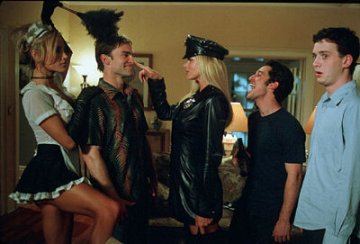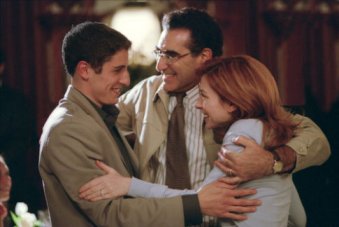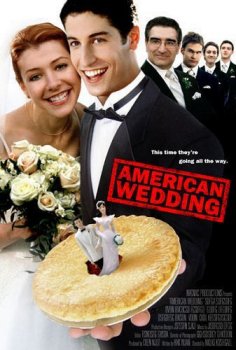|
American
Wedding
The cool
thing about a movie series you like is that you get to watch
its stars grow up before your very eyes. In the case of American
Wedding, those stars would be Chris Klein and Mena Suvari,
who grew up enough to stay completely away from this third
film. To be fair, their characters matured and grew to the
point they had no place anyway, and in the world of the American…
movies, that's as good as being dead.
Instead,
the wedding of the title is between Jim (Jason Biggs) and
Michelle (Alyson Hannigan), two of the goofier characters
of the franchise who have remained pretty much unchanged from
their initial appearances. Because they have now graduated
from college, marriage seems the next logical (?) step, and
hilarity should ensue as, without any reason at all, Michelle
wants a very traditional wedding.
It's
plausible enough, if not well motivated, and anyway, sex comedies
don't need much of a plot as long as the jokes keep coming.
But if a filmmaker is going to bother with story ideas, he
has a responsibility to develop them. Director Jesse Dylan
(yes, son of Bob and director of How High) simply doesn't
have the skill.
Dylan
depends on the script to make the mostly physical gags work.
Though there are some genuine laughs in the movie, many fall
flat. If the idea of the joke doesn't strike you as funny,
you're out of luck, because the direction makes no effort
to build it into something.
It also
proves that screenwriter Adam Herz got insanely lucky to have
the talented Weitz Brothers direct the first film. The most
annoying example of a bit that could have gone far comes after
the outrageously annoying (and strangely most realistic) Steve
Stifler (Seann William Scott) stumbles into a gay bar. At
first outraged that he's been flirting with drag queens, he's
more horrified that they don't want him. Desperately, the
Stiffmeister goes into a dance routine to make himself attractive
to the aptly named Bear (Eric Allan Kramer).
So why
isn't it funnier? The script would have you believe that Stifler's
dark secret is that he can dance, and in fact the only
way he would be allowed at Jim and Michelle's wedding is if
he would teach Jim how to trip the light fantastic.
 But
at no point in the film does Stifler actually appear to have
any dance skill other than the stereotypical awkward male
jerking around. Our only proof comes from Jim gasping in amazement,
"you're good!" Oh, and that Bear does come around, but Kramer
plays it with such a wink that you just know it's more patronization
than real arousal. But
at no point in the film does Stifler actually appear to have
any dance skill other than the stereotypical awkward male
jerking around. Our only proof comes from Jim gasping in amazement,
"you're good!" Oh, and that Bear does come around, but Kramer
plays it with such a wink that you just know it's more patronization
than real arousal.
Many
of the builds fare even less well. In a desperate bid to give
Finch (Eddie Kaye Thomas) something to do, he vies with Stifler
for the attentions of Michelle's sister Cadence (January Jones).
After a pretty good set-up that to become what Cadence likes,
both men switch personalities, Finch just fades away, only
to come back when Dylan needs a really whorish reaction shot
to explain to us that something gross (hence funny) just happened.
The least
funny of the original foursome, Kevin (Thomas Ian Nicholas),
might as well not be there. He doesn't even rate a subplot
(though he mentions a girlfriend), but as Nicholas doesn't
have anything else to do, he shows up for the sake of filling
out the wedding party.
Where
Dylan does succeed is in his casting. In fact, it's more than
succeeding, it's completely lucking out. Adding Kramer to
the group (inexplicably, Bear becomes a wedding guest) works
extremely well, for though he's "designed" as a stereotype,
he refuses to play it that way. He's just a guy that happens
to have no seat in his leather pants.
As Michelle's
parents, Deborah Rush and Fred Willard bring a little more
than cliché to their uptight WASP couple. You get the sense
that Rush really just wants the best for her little girl,
oblivious to her (self-described) nympho nature. Willard,
too, has a sincerity that belies the part. When he overcomes
his own prejudices to wish "many happy sitting shivas" to
Jim's family, you know his heart is in it.
 True,
Dylan inherited some of his cast, a group that continues to
make the movie watchable. The little Kaye gets to do that
isn't mugging has a sublimity that says movies just
don't know what to do with him. Even though Scott has become
a parody of himself in a tremendously short time, he knows
what he's doing to wring every possible laugh out of Stifler's
jerkiness. Though at times you may long for the subtlety of
his work in, say, Dude, Where's My Car?, Scott is struggling
against turgid direction. True,
Dylan inherited some of his cast, a group that continues to
make the movie watchable. The little Kaye gets to do that
isn't mugging has a sublimity that says movies just
don't know what to do with him. Even though Scott has become
a parody of himself in a tremendously short time, he knows
what he's doing to wring every possible laugh out of Stifler's
jerkiness. Though at times you may long for the subtlety of
his work in, say, Dude, Where's My Car?, Scott is struggling
against turgid direction.
The absolute
gem, though, is Eugene Levy as Jim's Dad. Though Jim himself
seems only slightly above borderline retarded, his father
believably loves him. Not only can Levy waggle his eyebrows
to comedic effect better than any man alive, he never forgets
to be real underneath it. When Michelle blurts out that Jim
considers his father a very wise man, you can see the surprised
gratitude shining in Levy's eyes.
It's
a moment that comes by accident, clearly all Levy, and it's
a shame that Dylan couldn't create more like it. For that
moment, American Wedding becomes more than just a cheap
sex comedy. It becomes something you can say you kind of liked.
Rating: 
|

 But
at no point in the film does Stifler actually appear to have
any dance skill other than the stereotypical awkward male
jerking around. Our only proof comes from Jim gasping in amazement,
"you're good!" Oh, and that Bear does come around, but Kramer
plays it with such a wink that you just know it's more patronization
than real arousal.
But
at no point in the film does Stifler actually appear to have
any dance skill other than the stereotypical awkward male
jerking around. Our only proof comes from Jim gasping in amazement,
"you're good!" Oh, and that Bear does come around, but Kramer
plays it with such a wink that you just know it's more patronization
than real arousal.
 True,
Dylan inherited some of his cast, a group that continues to
make the movie watchable. The little Kaye gets to do that
isn't mugging has a sublimity that says movies just
don't know what to do with him. Even though Scott has become
a parody of himself in a tremendously short time, he knows
what he's doing to wring every possible laugh out of Stifler's
jerkiness. Though at times you may long for the subtlety of
his work in, say, Dude, Where's My Car?, Scott is struggling
against turgid direction.
True,
Dylan inherited some of his cast, a group that continues to
make the movie watchable. The little Kaye gets to do that
isn't mugging has a sublimity that says movies just
don't know what to do with him. Even though Scott has become
a parody of himself in a tremendously short time, he knows
what he's doing to wring every possible laugh out of Stifler's
jerkiness. Though at times you may long for the subtlety of
his work in, say, Dude, Where's My Car?, Scott is struggling
against turgid direction.





